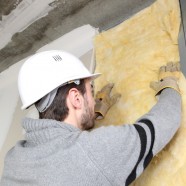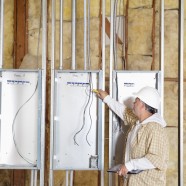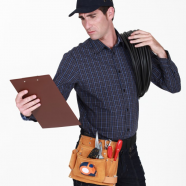Choosing an Electrical Contractor: Why Age Is a Factor
Ever heard the saying “age is only a number”? We’d like to say that we agree, and that it’s a number that doesn’t matter much, and in most things, that’s true.
Except, of course, when it comes to hiring an electrical contracting firm.
When you’re talking about commercial electrical, or even residential electrical in South Florida, and you’re shortlisting companies that might be able to help you solve your electrical problems on an existing project or a new build, then you almost certainly want to go with a contractor who has been around for a healthy number of years, and here’s why.
Experience Is Critical
Becoming an electrician is a long process, that involves theoretical study and practical apprenticeship, and that’s just to qualify! It takes many more years to accumulate practical, on the job experience that covers most situations you would encounter on a job site.
A brand new contracting company, set up by a newly qualified electrician, is going to have at least a few years of learning on the job ahead of them before they’re ready to take on complex projects.
Processes Matter
Working as an electrical contractor in any state means complying with local legislation related to permits, inspections, building codes and more. Even if you’re a great electrician, it can take a little time to get used to all the red tape.
Aside from the processes themselves, there are usually key players involved in approvals, inspections and other elements of an electrical project, and while no one can influence the decision making process, it helps to know who to speak to when. This is just another reason why the age of a company and the experience of the contractor makes a difference.
Supplier Relationships
Another reason why it’s better to work with an established electrical contractor, whether it’s for commercial electrical, an electrical maintenance contract or residential installations, is that established contractors will have established supplier relationships. They’ll know where to find the highest quality parts and materials quickly and at the right price, and there will be fewer delays in delivery to your job site.
Financial Stability
Ask any new contractor who is just starting out what their biggest challenges are, and there’s a good chance they’ll tell you it’s capital and cash flow. Every contractor goes through the same thing at first, and while that’s not necessarily a bad thing, it can make it tricky for new contractors to finance bigger projects. It can also lead to delays on projects of all sizes, or to payment issues.
We’ve Stood the Test of Time
There’s a reason why we know so much about the challenges of being and working with new electrical contractors: we’ve been there. Except that we were there in the 1980s, and we’ve got past all the teething problems.
We’ve got experience in all kinds of commercial and residential installations and electrical maintenance contracts. We’ve got the best technical team possible, and we’ve got relationships with all the major suppliers. We’re stable, we have the capacity to handle projects of all sizes, and we know the regulations in Florida like the backs of our hands.
That’s why, when you choose an electrical contractor, it makes sense to choose one who has stood the test of time. So yes, when it comes to choosing an electrical contractor, age does matter!
Read MoreBetter Insulation Saves Money and Prevents Hay Fever!
These days, we’re all more aware of our carbon footprint, our energy consumption, and the need to be more cautious about the resources we use. Even if you’re not actively trying to “live green” you almost certainly know that using more energy hurts your wallet!
Whatever your reasons for energy conservation, if you’ve done any research at all, you probably know that better insulation is a huge factor in household energy consumption, but did you know that better insulation can also help your hay fever this allergy season?
Insulation and Air Flow
The reason why insulation is important for energy conservation is that proper insulation helps to make your home air tight, and prevents the flow of air (and heating and cooling) from inside your home to the outside world.
Because you’re containing the air in your home to within the walls, your heating and cooling systems aren’t working as hard to control the temperature of new air all the time, and that can result in big savings in your utility bills.
Ask any electrician in South Florida, and they will confirm that no matter how great your HVAC equipment is, if your home is poorly insulated, you’re going to spend a lot more heating and cooling it!
Insulation and Hay Fever
It’s obvious that ensuring that there is as little air flow between the inside and the outside of your home is important for energy conservation, but how does it help to prevent hay fever? Much the same way actually.
When your home is poorly insulated, there is a constant flow of air from the outside to the inside and vice versa, and just as that allows heat to travel between the inside and outside, it also allows pollen laden air to travel through cracks around windows and doors, or through poorly insulated walls, soffits and ceilings.
Even if you have a HEPA filtration system installed in your home, it might not be able to cope with all those extra allergens, and they may well cause you to have more allergic reactions this allergy season.
Not only does poor insulation allow pollen into your home though. It may even be responsible for some of the trouble!
Over the years, people have used some strange things to insulate their homes, from newspaper to straw, and if you live in an older home, there could be all sorts of allergens in your walls and ceiling! Not to mention when those materials start to mold, and the fungal spores cause trouble all on their own!
Get to the Bottom of the Problem
If you’ve noticed that your utility bills are up, and your HVAC equipment is working harder than it should be, then it’s important for your wallet and your allergies that you figure out the problem! A site visit by an electrician can confirm that there aren’t any electrical problems, and if there aren’t you may want to consider investigating your insulation a little more closely! Even small changes might make all the difference.
Read MoreRenovating Business Premises? Discover What to Budget for Electrical Work
Figuring out what the electrical for your business premises renovation will cost can be a tricky business. It’s almost impossible for any commercial electrical contractor to provide an accurate estimate without having a significant amount of information to go on. There are fixed and variable costs involved, and different contractors will all calculate things a little differently.
A lot will hinge on the building in question too, and how extensive the electrical repairs and additions will be. Here are a few costs that you might want to consider factoring into your budget (and mentioning to contractors who provide pricing!)
1. The Extent of the Renovation
There are renovations, and then there are renovations! Are you doing a basic, superficial remodel of your business premises, or are you completely changing the purpose and use of certain spaces? If you need to make major changes like changing the phase of power in a part of your building, or adding a new area completely, that will have a big impact on costs.
2. The Existing Electrical
If your business premises is older, it may have electrical that is “grandfathered in.” That means that even though it’s not up to current codes and standards, it’s considered acceptable because its existing. If you make changes to the electrical system, that might change, and you might need to rewire your premises completely. This is why it’s so important to have a commercial electrical contractor inspect your premises before quoting on any changes or renovations. They may need to do a lot more than simply add to your system!
3. Working Conditions
The conditions under which the work on your existing business premises needs to take place can have an impact on the price that you pay for the electrical portion of your commercial renovations in South Florida. If your electrical contractor has to work nights or weekends, for instance, or if they will be working in confined spaces, that can increase the cost. This is another good reason to ensure that your contractor knows what the work will entail before they provide a quotation.
Planning and Requesting a Quotation
Even if you call a commercial electrical contractor to ask for a ball park figure for your business premises renovation, all they can give you without all of the facts is a rough estimate, that will very likely be vastly different to the final cost of your project. The more information you can provide about what you are doing, how it will be done, and what the electrical contractor will need to do for you, the more likely you are to get an accurate estimate of costs.
Spend some time planning and designing your new space. Get some preliminary plans drawn up for the design. Invite commercial electrical contractors to visit your premises to assess the extent and scope of work to be done. Get a few estimates of cost, and build in a health five to ten percent contingency.
Commercial renovations (or any renovations for that matter) are some of the trickiest types of construction to price accurately, because there are always unknown factors hidden in your walls. A little planning and forethought, and working with a good contractor, however, can help to develop a plan that fits your needs and your budget.
Read MoreElectrical Honey-Dos: When Should You Call an Electrical Contractor?
Most people have a level of comfort when it comes to small electrical repairs. Changing the light in a stove or fridge, switching out a light fixture, and other minor tasks may all fall into the realm of things that your “honey” can do for you, but there are times when you need professional help. Here are a few instances where you should not attempt to do repairs yourself.
1. When There Is Visible Damage
When you can see visible damage to wiring, when an outlet has a scorch mark or when something has melted, it’s a sign that all is not well with your electrical, and that can be dangerous (or deadly) to people who aren’t qualified electricians. If you see this sort of damage, then this is not an electrical DIY project. Call the professionals, sooner rather than later.
2. When There’s Water Damage
When your electrical problems are also water problems, then you definitely need to call in the professionals – electrical and otherwise. Water and electricity are a dangerous combination, and not one that you want to mess with.
3. When You Need Changes Made
Adding an outlet. Expanding a panel. Changing the wiring in part of your home, or adding more wiring for an addition. These are all things that you need the expertise of a professional to do correctly and safely, and are not tasks that you want to undertake as DIY residential electrical in South Florida.
4. When There Are Shorts or Sparks
If you’re having trouble with your panel, and you regularly have circuit breakers tripping, that is a clear sign of serious electrical problems somewhere in your home. Likewise, if you see sparks anywhere in your home electrical, then you almost certainly have a problem that needs professional attention.
5. When You Live in an Old Home
Older homes often have complicated, outdated or just plain weird electrical. If your home is older, then there’s a good chance that you could have knob and tube wiring, asbestos in your walls or other hidden dangers to contend with, you might not even recognize some of the things on the board, and there may be fire hazards hidden in your walls. If you start having electrical problems in an older home, chances are you’re going to need professional help.
6. When You’re Doing a Major Appliance Upgrade
If you’re remodeling your kitchen, and you’re going from modest, old style appliances to power hungry commercial grade ones, or you want to turn a room into a home theater, then you probably need professional help. Major changes to your power consumption can overload your panel, and if you’re planning anything big, it’s best to get the all clear first.
This list is not complete, and there are probably many other times when you would need electrical protection in West Palm Beach. If you’re in any way unsure or uneasy about any electrical DIY, minor or major, contact an electrical contracting company. They’ll be able to tell you if it’s something that a handy homeowner can handle, or whether you need a little more skill (or a permit!)
Read MoreBuilding a Housing for Your Standby Generator
If you are installing a home standby generator, and you live in Florida, you are probably motivated by bad weather. Because sure, the energy savings you get when the power is out for a few days thanks to a big storm are good for your wallet, but they’re really not good for anything else, are they?
Before you contact contractors about your generator and to get a price for the electrical installation in West Palm Beach, it’s a good idea to figure out where you’re going to place the generator, and how you’re going to keep it safe from the storm. Because diesel powered generators really aren’t a great addition to the décor in your home, and the weather outside is likely to be a factor when it’s needed. Here are a few things to keep in mind while you construct the housing:
- Ensure that your design includes a raised platform of some kind, to keep your generator out of any water that may be on the ground. Storms can cause flash floods or water accumulation of a few inches to a foot or more, and it’s always a good idea to keep your generator above ground for that reason. Be sure to make the platform long enough that you can wheel the generator forward when you need to refill the fuel tank or make repairs to the unit.
- Make sure that you construct your generator enclosure close to your home. Whether you choose an automatic or manual transfer for the system, your electrician will need to connect wires to the generator, and you want to be able to get to it easily too.
- Measure the frame of the home standby generator, from the ground to the highest point, across at the widest point, and from the front to the back at the widest point. Add two or three inches to each dimension. Those will be your inside dimensions for your frame.
- Build a frame for the enclosure. You can make this out of wood or steel (depending on your carpentry or welding skills). Ensure that you use the measurements you have taken before as the inside dimensions for your frame. If your generator is going to be close to your home, you might not need a back panel, but you can add a front and a back panel if you hinge them for easy access.
- Cover the frame with plywood or steel sheeting. If you choose plywood, remember that you will need to seal the enclosure well, to prevent the wood from rotting. If you opt for steel, choose a galvanized product that will resist rust. Use screws or nails to fix panels to a wooden frame, or rivets to fix to a steel frame.
Your home standby generator is built to be hardy and tough, and it should be able to handle a little water without too much trouble. However, Florida storms are a lot more than a little water, which is why a home generator enclosure is a good idea. It doesn’t have to be completely air tight either. Just make sure it keeps most of the weather out, and that it’s located outside of your home, so the fumes from the generator running are safely outside your home.
Read MoreWhat’s Covered in a Commercial Electrical Maintenance Agreement
Commercial electrical maintenance is a critical element in maintaining the health and safety of a workplace, ensuring that your business insurance policy covers you in the event of a malfunction, and for ensuring that your commercial power stays stable and operational when you need it. However, even if you are looking for a contractor to enter into an electrical service contract, you might not be sure exactly what you can expect.
While these types of electrical maintenance contracts can vary greatly from one contractor to the next, there are a few things that most good commercial electrical maintenance agreements will cover. This is what you should look for:
Read More






Recent Comments